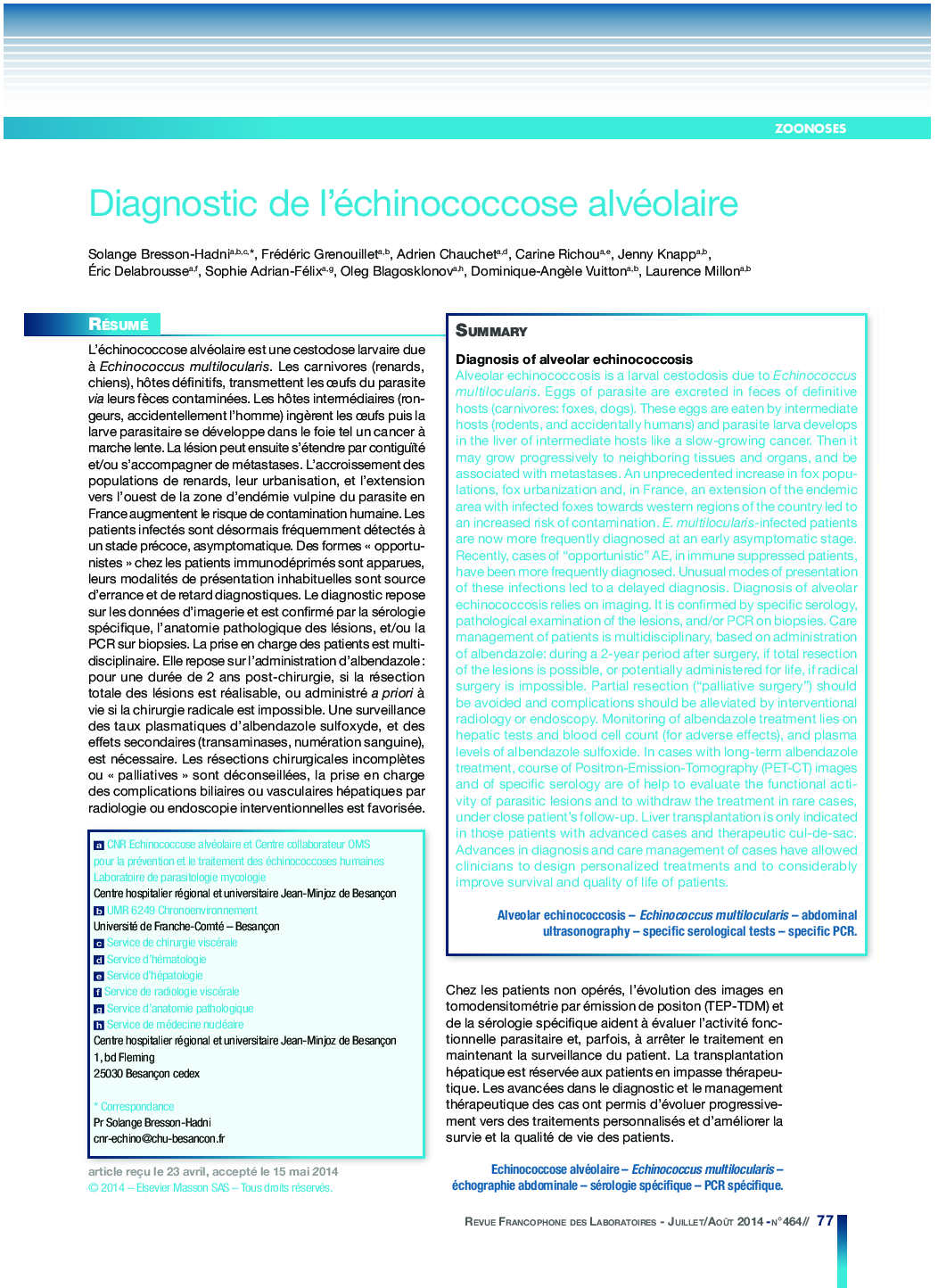| کد مقاله | کد نشریه | سال انتشار | مقاله انگلیسی | نسخه تمام متن |
|---|---|---|---|---|
| 7649051 | 1495057 | 2014 | 11 صفحه PDF | دانلود رایگان |
عنوان انگلیسی مقاله ISI
Diagnostic de l'échinococcose alvéolaire
دانلود مقاله + سفارش ترجمه
دانلود مقاله ISI انگلیسی
رایگان برای ایرانیان
کلمات کلیدی
موضوعات مرتبط
مهندسی و علوم پایه
شیمی
شیمی آنالیزی یا شیمی تجزیه
پیش نمایش صفحه اول مقاله

چکیده انگلیسی
Alveolar echinococcosis is a larval cestodosis due to Echinococcus multilocularis. Eggs of parasite are excreted in feces of definitive hosts (carnivores: foxes, dogs). These eggs are eaten by intermediate hosts (rodents, and accidentally humans) and parasite larva develops in the liver of intermediate hosts like a slow-growing cancer. Then it may grow progressively to neighboring tissues and organs, and be associated with metastases. An unprecedented increase in fox populations, fox urbanization and, in France, an extension of the endemic area with infected foxes towards western regions of the country led to an increased risk of contamination. E. multilocularis-infected patients are now more frequently diagnosed at an early asymptomatic stage. Recently, cases of “opportunistic” AE, in immune suppressed patients, have been more frequently diagnosed. Unusual modes of presentation of these infections led to a delayed diagnosis. Diagnosis of alveolar echinococcosis relies on imaging. It is confirmed by specific serology, pathological examination of the lesions, and/or PCR on biopsies. Care management of patients is multidisciplinary, based on administration of albendazole: during a 2-year period after surgery, if total resection of the lesions is possible, or potentially administered for life, if radical surgery is impossible. Partial resection (“palliative surgery”) should be avoided and complications should be alleviated by interventional radiology or endoscopy. Monitoring of albendazole treatment lies on hepatic tests and blood cell count (for adverse effects), and plasma levels of albendazole sulfoxide. In cases with long-term albendazole treatment, course of Positron-Emission-Tomography (PET-CT) images and of specific serology are of help to evaluate the functional activity of parasitic lesions and to withdraw the treatment in rare cases, under close patient's follow-up. Liver transplantation is only indicated in those patients with advanced cases and therapeutic cul-de-sac. Advances in diagnosis and care management of cases have allowed clinicians to design personalized treatments and to considerably improve survival and quality of life of patients.
ناشر
Database: Elsevier - ScienceDirect (ساینس دایرکت)
Journal: Revue Francophone des Laboratoires - Volume 2014, Issue 464, Part 1, JulyâAugust 2014, Pages 77-87
Journal: Revue Francophone des Laboratoires - Volume 2014, Issue 464, Part 1, JulyâAugust 2014, Pages 77-87
نویسندگان
Solange Bresson-Hadni, Frédéric Grenouillet, Adrien Chauchet, Carine Richou, Jenny Knapp, Ãric Delabrousse, Sophie Adrian-Félix, Oleg Blagosklonov, Dominique-Angèle Vuitton, Laurence Millon,